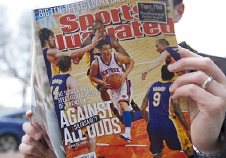3Qs: Analyzing ‘Linsanity’

New York Knicks point guard Jeremy Lin, the league’s first Asian-American player of Chinese or Taiwanese descent, has become the star of the sports world, averaging more than 22 points, eight assists and two steals per game in the first 12 starts of his young career. We asked three Northeastern experts to evaluate his success.
Jarrod Chin, director of Sport in Society’s Violence Prevention and Diversity program:
Two weeks ago, boxer Floyd Mayweather Jr. caused a stir by tweeting, “Jeremy Lin is a good player, but all the hype is because he’s Asian…” How much of the attention surrounding Lin stems from the fact that the first Asian-American NBA player of Chinese or Taiwanese descent has experienced a historic start to his career?
The attention surrounding Jeremy Lin is based in part on the fact that his athletic ability challenges our stereotypes about what certain groups of people can do in our society. Too often “the model minority” stereotype limits what Asian-Americans are seen as capable of doing. Not since Wat Misaka played for the New York Knicks in 1947 has an Asian-American played in an NBA game. Why, in more than 60 years, have no other Asian-Americans played in the league? Was it just a lack of talent or were there other factors, such as racial stereotypes, that have kept them from competing at the sport’s highest level?
Growing up in America, I had very few Asian-American athletes or role models that I could look up to and aspire to be like. But by challenging stereotypes, Lin has become a role model for young people on how you can overcome obstacles through hard work and perseverance, demonstrating that athletic and academic achievement are not mutually exclusive. My hope is that through his success, Lin will be able to open up opportunities for the disenfranchised.
Paul Fombelle, assistant professor of marketing in the College of Business Administration:
A pair of sideline, center-court seats at Madison Square Garden cost $9,999, up more than 100 percent since Lin caught fire. What kind of short- and long-term impact would the 23-year-old phenom’s continued success have on both the club’s and the league’s bottom line?
I think the long-term impact of Jeremy Lin is still too far away to predict given that he has only played in a handful of games. But there is no denying his instant impact on the Knicks and its parent company Madison Square Garden Co. (MSG). Demand for Knicks tickets has shot through the roof, ticket resale prices are some of the highest ever and stores cannot keep Lin jerseys in stock. The team’s ratings on the MSG Network and traffic on its website have also ballooned. Lin’s TV ratings have matched that of when megastar Carmelo Anthony arrived at MSG.
It’s crazy to think that one player actually propelled MSG to an all-time-high share price on the Nasdaq. Up until Lin hit the scene, MSG was actually reporting a loss for the lockout-shortened season. Now profits are drastically on the rise for everyone involved. There even seems to be a battle over the legal rights to the term “Linsanity.”
Rebecca Shansky, assistant professor of psychology in the College of Science:
Lin’s unexpected rise to national – and global – prominence has appeared to fuel even stronger play in the young star. But how will the added pressure to perform at a consistently high level affect his mental acuity?
There’s a lot of evidence that exposure to stress can cause deficits in what cognitive neuroscientists call “executive function” – processes like decision-making, planning and concentration. It’s entirely possible that the pressure Lin feels from his newfound fame could have some negative effects.
Studies, however, have also found that the degree to which stress affects a person’s cognitive function depends on how much control the person feels they have over the stress. So in Lin’s case, if he feels that he can respond to the pressure to play really well by continuing to rack up points, then stress itself should have negligible effects.





